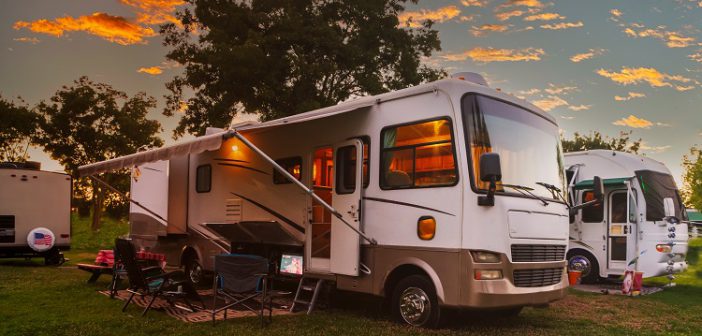The desert sun was rising, coffee was brewing, and your little camper was parked in the perfect quiet spot for the morning. There was no city noise, no rush, just the soft hum of the wind and the freedom of the open road. Living full-time on wheels has its challenges, but it also gives you something few people experience: the ability to chase nature, not just vacation in it.
As a full-time traveler, you already think outside the box. Maybe you live light, travel in used pop-up campers, or spend more time outdoors than in front of a screen. Whatever your setup, it’s the perfect chance to take sustainable living on the road. In this guide, you’ll find eight ways to embrace eco-conscious habits and make your journey memorable and meaningful.
1. Choose a Lightweight, Fuel-Efficient RV
The vehicle you travel in significantly affects how much fuel you burn and how far you can stretch your resources. Smaller RVs, teardrop trailers, and pop-up campers are great for cutting down on weight, which means better fuel economy. Even better if you go for a used model — reusing gear is a simple but powerful way to reduce waste.
Pop-up campers, in particular, are lightweight, easy to tow, and often need less energy to heat or cool. Less weight also means your vehicle doesn’t work as hard, lowering your emissions and gas bill.
2. Plan Smart Routes and Slow Down
It might feel exciting to go from one beautiful place to the next every few days, but frequent moves mean burning more fuel. Planning a route that makes sense geographically can save you time and reduce your environmental impact.
Try staying longer in each place when you can. This gives you a chance to really connect with the area, explore hidden gems, and reduce the number of miles you travel. Driving slower also helps with fuel efficiency, so take your time and enjoy the view.
3. Use Solar Power and Natural Energy
Switching to solar power is one of the easiest ways to make your travels more sustainable. Portable solar panels can charge your devices, power your lights, and even keep your fridge running. Once you invest in a good setup, you’ll save on fuel costs and reduce your reliance on generators.
You can also reduce energy use by parking smart. In colder months, look for spots with good sun exposure. In hotter months, seek out shade and crack your windows to stay cool without running fans or air conditioners nonstop.
4. Save Water Like a Pro
Water conservation is good for the planet and necessary when you’re traveling off-grid. Start with low-flow faucets and showerheads. These small upgrades make a big difference in how much water you use every day.
You can also reuse greywater safely for certain tasks, like flushing your toilet or rinsing off gear. Keep track of your water usage and plan refills accordingly. Being water-wise helps you stay off-grid longer and minimizes your environmental footprint.
5. Handle Waste Responsibly
Proper waste management is key when living on the road. Dump black and grey water only at approved stations. Use biodegradable soaps and cleaners to avoid harming the environment when rinsing dishes or showering outdoors.
Cut back on single-use plastics by carrying reusable dishes, grocery bags, and water bottles. Compost when you can, and sort recyclables as you go. It might take a little effort, but leaving no trace is part of the lifestyle, and one of the best ways to show respect for the places you visit.
6. Shop Local and Support Sustainable Choices
Supporting local farmers, markets, and businesses keeps small communities thriving and reduces the carbon footprint of the goods you buy. Food that’s grown nearby doesn’t have to travel far, which saves energy and fuel.
When shopping, look for eco-friendly products, such as bamboo utensils, natural soaps, and items made from recycled materials. By choosing better products, you encourage better practices.
7. Embrace the Minimalist Life
If you’re traveling full-time, chances are you’ve already cut back on stuff. But every so often, it’s worth revisiting what you carry. The lighter your load, the less fuel you’ll use and the less clutter you’ll have in your space.
Stick to essentials and let your experiences take up the most room in your life. Let go of items you haven’t used in a while and donate them where they’re needed. Minimalist living makes everything feel easier and keeps your focus on the adventure.
8. Share What You Know
Sustainable living is about what you do and about what you inspire. Talk to other travelers about the simple changes you’ve made. Share your tips online or through social media. Join local cleanup events or start one in your campground.
You don’t have to be an expert to make an impact. By living intentionally and leading by example, you’ll influence others to think about their own habits. And who knows? You might be the reason someone else chooses a greener path.
Travel Green, Live Fully
Choosing to live on the road full-time is already a bold step. Choosing to do it sustainably takes it even further. When you take the time to plan routes, conserve resources, and support better habits, you’re doing more than exploring; you’re protecting the places you love.
These eight habits aren’t about being perfect. They’re about progress, awareness, and intention. So if you’ve been wondering how to lean into sustainable living while traveling full-time, now you have a solid starting point. Keep the wheels rolling, but make every mile matter.
Your Green Adventure Starts Now
Living on the road gives you freedom like no other lifestyle, and with that freedom comes the chance to make a difference. The small choices you make each day, how you travel, where you shop, and what you use, add up in a big way over time.
You don’t have to overhaul everything overnight. Start with a few changes, stick with them, and stay mindful along the way. If you’re ready to embrace sustainable living as a full-time traveler, now’s the perfect time to get rolling. Your next adventure can be just as kind to the planet as it is exciting for you.





Sustainable living is possible even when you’re always on the move. Use reusable containers, support local businesses, reduce plastic use, and offset your carbon footprint. Shop mindfully check the food lion ad this week for local, eco-friendly deals while on the road.
Traveling from Perth, Australia, to the mesmerizing kingdom of Thailand is an adventure that combines the thrill of international air travel with the freedom of exploring scenic destinations like Pattaya on two wheels. This comprehensive guide covers everything you need to know about booking flights from Perth to Thailand and renting a motorbike in Pattaya. Whether you’re a first-time traveler or a seasoned explorer, this article offers extensive information to help you plan a smooth and unforgettable journey. Art in Paradise Pattaya
Honestly, I lose more than I win — that’s on me. But even as someone with zero luck, I still keep coming back to http://ignition-au.com/ because it doesn’t feel scammy. I’ve been down on slots, up on blackjack, and then gave it all back on roulette (don’t ask). But throughout all that, my deposits went through instantly, and withdrawals worked without issues — even when I cashed out small wins like $30. Customer support never gave me attitude, even when I was obviously annoyed. There are no shady popups or “mystery fees” — what you see is what you get. They also don’t bug you with spam emails, which I appreciate. One thing I’ve learned: always set a spending limit, it helps more than you think. And their site works great on mobile, which is where I usually play (sometimes when I shouldn’t). Losing sucks, but at least here, it feels fair.
I used to play on two other casinos before finally moving over to Canplay casino Canada and honestly, I should have switched earlier. The difference in transparency and functionality is huge. I deposited $50, claimed the welcome bonus, and everything from the 35x wagering to max bet limits was clearly displayed. No hidden rules or sudden disqualifications. I mainly play slots like Big Bass Splash and Reactoonz, and everything runs smooth both on desktop and mobile. Withdrew $120 after clearing the bonus and got the money through Interac in less than 12 hours. The loyalty points are a bonus — I’ve already converted a few bucks back into my account. The live dealer section is solid too, especially blackjack. Tip: don’t forget to activate the cashback each Monday — it’s easy to miss but actually helpful.
I have express a few of the articles on your website now, and I really like your style of blogging. I added it to my favorite’s blog site list and will be checking back soon…
8 Things We Can Do as a Full-Time Traveler highlights ways to make the most of a nomadic lifestyle. It includes working remotely, volunteering, learning local languages, blogging or vlogging your journey, slow traveling to save money, building online income streams, connecting with local communities, and staying healthy on the road.
There are numerous chances to discover, grow, and learn when traveling full-time and making the journey more enjoyable. Moreover, having the best MBA dissertation help UK to secure the writing work perfectly and enhance research skills to meet the writing process.
This is a beautifully written and inspiring piece—clear, warm, and grounded in practical advice. If your goal is to publish it as a blog post, social media caption series, or part of a digital guide, it’s already strong. That said, here are a few suggestions to elevate it even further. Dog translator online free
So me and three of my mates from work started this weird tradition: every Friday night we pick a random online game to play and keep track of who wins most. It started as a dumb joke, but it’s been six months and we haven’t missed a week. One of the guys found this site where we could all play blackjack live and it ended up being way more fun than expected. The real dealers and live tables made it competitive in a good way. Plus, we rotate who buys lunch on Monday based on who wins least — keeps it spicy. For anyone into a bit of casual group fun like us, check out https://king-billy-wincasino.com/ — that’s where we’ve been doing our thing.
India’s Rising Demand for Temporary Staffing
Understand what’s driving the surge in temporary staffing services and how businesses benefit from short-term talent.
Read More – https://intersclean.com/the-growing-demand-for-temporary-staffing-services-in-india/
Building Cohesive Teams with DISC Assessment and Core Team Traits
Discover the five key traits of a cohesive team and how DISC assessment supports effective team building.
Read More – https://salesrepsnow.com/2024/10/17/building-winning-teams-the-five-characteristics-of-a-cohesive-team-and-the-role-of-disc-assessment/
I am always searching online for articles that can help me. There is obviously a lot to know about this. I think you made some good points in Features also. Keep working, great job !
The material and aggregation is excellent and telltale as comfortably.
I am really enjoying reading your well written articles. It looks like you spend a lot of effort and time on your blog. I have bookmarked it and I am looking forward to reading new articles. Keep up the good work.
You have done a amazing job with you website
Wow! Such an amazing and helpful post this is. I really really love it. It’s so good and so awesome. I am just amazed. I hope that you continue to do your work like this in the future also.
Thanks for providing recent updates regarding the concern, I look forward to read more.
I am a new user of this site so here i saw multiple articles and posts posted by this site,I curious more interest in some of them hope you will give more information on this topics in your next articles.
I would recommend my profile is important to me, I invite you to discuss this topic…<a href=”https://podillia.info/”>Podillia news</a>
This is also a very good post which I really enjoyed reading.
Great tips! As a full-time traveler, I’ve found adopting eco-friendly transport options like a catamaran st maarten with solar-powered systems a game-changer. It’s an enjoyable and sustainable way to explore while reducing our footprint. Every small choice really does count.
I recently came across your article and have been reading along. I want to express my admiration of your writing skill and ability to make readers read from the beginning to the end. I would like to read newer posts and to share my thoughts with you.
This is also a very good post which I really enjoyed reading. It is not every day that I have the possibility to see something like this..
Things you can do as a full-time traveler include exploring diverse cultures, engaging in local traditions, working remotely from inspiring locations, and continuously learning through real-world experiences. A travel lifestyle offers the flexibility to adapt plans, follow spontaneous opportunities, and discover places you never anticipated. There’s a chance that embracing this way of living could lead to unexpected friendships, new skills, and a deeper understanding of the world. Perhaps each journey could open doors you didn’t even know existed.
Can I simply say what a reduction to search out someone who truly is aware of what theyre speaking about on the internet. You positively know learn how to convey a difficulty to light and make it important. Extra individuals need to read this and perceive this aspect of the story. I cant consider youre not more popular because you undoubtedly have the gift.
Can I simply say what a reduction to search out someone who truly is aware of what speaking about on the internet. You positively know learn how to convey a difficulty to light and make it important. Extra individuals need to read this and perceive this aspect of the story. I cant consider
Can I simply say what a reduction to search out someone who truly is aware of what speaking about on the internet. You positively know learn how to convey a difficulty to light and make it important. Extra individuals need to read this and perceive this aspect of the story. I cant consider <a href=”https://in.poy.to/”>free classifieds india</a>
Can I simply say what a reduction to search out someone who truly is aware of what speaking about on the internet. You positively know learn how to convey a difficulty to light and make it important. Extra individuals need to read this and perceive this aspect of the story. I cant consider <a href=”https://in.poy.to/”>free classifieds </a>
Extra individuals need to read this and perceive this aspect of the story. I cant consider <a href=”https://in.poy.to/”>free classifieds </a>
Searching for cheap business class flights to turkey? Flyer Club makes it easy to find the best deals from leading airlines, combining comfort, convenience, and affordability. Whether you’re heading to Istanbul, Antalya, or other beautiful destinations, you can enjoy premium travel without paying premium prices.
Business class perks include extra legroom, priority boarding, and fine dining onboard, ensuring your trip starts in comfort and style. With Flyer Club’s constantly updated offers, finding the perfect flight to Turkey has never been easier.